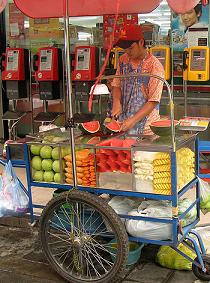A 59-year-old paani puri vendor in Naupada (near Thane, that’s in India) was detained on Thursday for peeing into a small utensil that he otherwise used to serve his customers.
Consumer video cams rule.
The Mumbai Mirror reports that Rajdev Lakhan Chauhan, who has been serving chaat in Bhaskar Colony in Naupada for four years, was picked up by cops after  a resident captured the rather disgusting act on camera from a nearby balcony.
a resident captured the rather disgusting act on camera from a nearby balcony.
Whistle-blower Ankita Rane, a 19-year-old student, was shocked when she first spotted Chauhan urinating into his lota. “His stall is right below our building. Though there were rumours of him being quite gross, his stall was always flooded with customers,” she said. “Since I had nothing to do after my exams, I started keeping an eye on him.
“Every day, he’d pee into the utensil and then use the same to pour tangy water into the ragda or stir the paani puri mix. Some customers even used that lota to drink water once they had finished eating.”
When she told her family members and neighbours, however, they refused to believe her. When residents in the area saw the video she had recorded, they first beat up Chauhan before taking him to the police station.
“Residents of Bhaskar Colony came up with a video clip that showed Chauhan urinating in one of his utensils. We arrested him on Monday night and he confessed. His excuse was that he had nowhere else to pee as there was no urinal around,” Police Inspector Hemant Sawant said, adding that Chauhan said he felt uncomfortable peeing on the streets as Bhaskar Colony was a clean, residential area.

 consumers with safe, clean fruit. Authorities warned another survey will be taken at the end of the month after which vendors selling contaminated fruit will face up to two years in prison and fines of 20,000 baht ($650).
consumers with safe, clean fruit. Authorities warned another survey will be taken at the end of the month after which vendors selling contaminated fruit will face up to two years in prison and fines of 20,000 baht ($650).